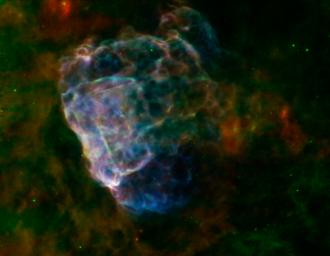The destructive results of a mighty supernova explosion reveal themselves in a delicate blend of infrared and X-ray light, as seen in this image from NASA's Spitzer Space Telescope and Chandra X-Ray Observatory, and the European Space Agency's XMM-Newton.
The bubbly cloud is an irregular shock wave, generated by a supernova that would have been witnessed on Earth 3,700 years ago. The remnant itself, called Puppis A, is around 7,000 light-years away, and the shock wave is about 10 light-years across.
The pastel hues in this image reveal that the infrared and X-ray structures trace each other closely. Warm dust particles are responsible for most of the infrared light wavelengths, assigned red and green colors in this view. Material heated by the supernova's shock wave emits X-rays, which are colored blue. Regions where the infrared and X-ray emissions blend together take on brighter, more pastel tones.
The shock wave appears to light up as it slams into surrounding clouds of dust and gas that fill the interstellar space in this region.
From the infrared glow, astronomers have found a total quantity of dust in the region equal to about a quarter of the mass of our sun. Data collected from Spitzer's infrared spectrograph reveal how the shock wave is breaking apart the fragile dust grains that fill the surrounding space.
Supernova explosions forge the heavy elements that can provide the raw material from which future generations of stars and planets will form. Studying how supernova remnants expand into the galaxy and interact with other material provides critical clues into our own origins.
Infrared data from Spitzer's multiband imaging photometer (MIPS) at wavelengths of 24 and 70 microns are rendered in green and red. X-ray data from XMM-Newton spanning an energy range of 0.3 to 8 kiloelectron volts are shown in blue.
NASA's Jet Propulsion Laboratory, Pasadena, Calif., manages the Spitzer Space Telescope mission for NASA's Science Mission Directorate, Washington. Science operations are conducted at the Spitzer Science Center at the California Institute of Technology in Pasadena. Spacecraft operations are based at Lockheed Martin Space Systems Company, Littleton, Colorado. Data are archived at the Infrared Science Archive housed at the Infrared Processing and Analysis Center at Caltech. Caltech manages JPL for NASA.
For more information about the Spitzer mission, visit http://spitzer.caltech.edu and http://www.nasa.gov/spitzer.

 Planetary Data System
Planetary Data System












